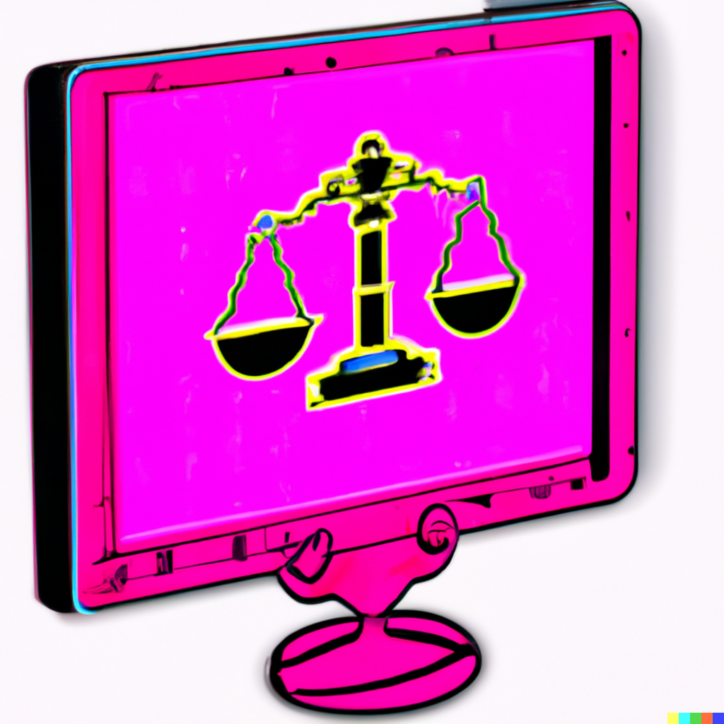Owners’ Rights vs. Tech Progress: Finding Where A.I. Fits into Intellectual Property Law

Artificial intelligence can help anyone appear to be an eloquent author, stunning visual artist, wunderkind programmer, eagle-eyed editor, or a growing host of other creative and technical professions.
But who should get credit for the product of that collaboration between the human user and A.I. model? You, or the A.I. model, or the developers of the A.I. model, or the creative and technical experts who produced the content that trained the A.I. model, or nobody?
That’s the question driving a collection of historic court cases that challenge our traditional notions of ownership and what constitutes fair use of others’ work.
If you haven’t already, be sure to check out the latest episode of Creativity Squared, featuring a discussion of these issues and more with prominent tech attorney Derrick L. Maultsby, Jr.
For more context, let’s look at some of the recent major developments in copyright law, and what it means for intellectual ownership in the age of artificial intelligence.
A.I.-Assisted Comic BookAuthor Gets Partial Copyright
She almost got it.
When comic book author Kris Kashtanova first sought copyright protection for Zarya of the Dawn last year, the United States Copyright Office (USCO) originally granted full protection to the entire work.
However, the USCO rescinded that protection shortly thereafter and initiated a secondary review of their decision upon learning that Kashtanova used Midjourney, the A.I. image generator, to produce the comic book’s images. The USCO’s seven major criteria for copyright eligibility require a work to be created by a human author.
During the review period, Kashtanova and her lawyer submitted a 13-page response to the USCO arguing that the work deserved full protection in the same way that photographers receive protection for their photos, even though they use devices (i.e., camera, photoshop) to produce the image. Quoting the USCO’s own language from a previous copyright decision, this excerpt from Kashtanova’s response hits at the crux of the argument:
“The crucial question is ‘whether the work is basically one of human authorship, with the computer [or other device] merely being an assisting instrument, or whether the traditional elements of authorship in the work were actually conceived and executed not by man but by a machine.”
In other words, “Kashtanova should get credit for the images because she conceived of the images and used Midjourney as an assisting instrument to execute their creation.”
Ultimately, the USCO was not convinced. In its final decision published earlier this year, the office granted only partial copyright to Kashtanova for the published text inside the comic book and the arrangement of the images, but not for the images themselves.
The USCO determined that there was too much “distance” between the input Kashtanova entered into Midjourney and the published output images. The office also made a critical distinction in the “assistance instrument” argument by comparing the use of Midjourney to hiring an illustrator, in which case the illustrator would receive the copyright for the images, not Kashtanova.
Despite the USCO’s reversal, Kashtanova still claims that Zarya of the Dawn is the first A.I.-assisted comic book to receive a U.S. copyright. Kashtanova has said that she plans to continue pursuing expanded copyright protection for A.I.-assisted works.
Suffice to say that this copyright case is just an early step in what will surely be a long road to update the rules of content ownership as new challenges arise from the use of A.I. in the creative process.
SCOTUS Won’t Consider Whether A.I. Can Hold Inventor’s Patent
Earlier this year, the U.S. Supreme Court ended a computer scientist’s attempt to secure patents on behalf of an A.I. that he claims “invented” a pair of products.
Stephen Thaler was trying to secure patent protection for a beverage holder and a light beacon device supposedly invented by an A.I. model that Thaler developed at his Missouri-based tech company.
Thaler claimed that his A.I. system, called DABUS (Device for the Autonomous Bootstrapping of Unified Sentience), invented the products entirely on its own. Thaler also made headlines recently for claiming that the same system was sentient.
In his argument for why DABUS should receive the patents, Thaler argued that the court’s refusal would contradict the underlying intent of the patent system to stimulate innovation and technological progress.
Despite his persistence, though, Thaler was ultimately turned down by the U.S. Patent and Trademark Office’s decision that patent law requires an inventor to be a human being. Thaler continued pursuing the matter through appeals to higher courts until the Supreme Court refused to let the case proceed.
However, Thaler’s efforts continue outside the borders of the United States. He’s working with The Artificial Inventor Project, an international group of intellectual property lawyers, to push similar court challenges in at least 18 other countries. The Artificial Inventor Project says its goals are to “promote dialogue about the social, economic, and legal impact of frontier technologies such as AI and to generate stakeholder guidance on the protectability of AI-generated output.”
Microsoft Will Shield A.I. Users from Copyright Lawsuits
Microsoft announced last week that it would assume any legal liability and defend copyright infringement claims brought against users of its highly-integrated Copilot A.I. system. They developed the system with guardrails against the possibility of results infringing on copyrighted material, and whether for purely PR or not, are standing by what they’ve built.
In their announcement, Microsoft indicated that it’s making the commitment in order to support commercial Copilot users who may fear the consequences of copyright infringement. Users of free Copilot services are not eligible for protection under Microsoft’s commitment.
“If a third party sues a commercial customer for copyright infringement for using Microsoft’s Copilots or the output they generate, we will defend the customer and pay the amount of any adverse judgments or settlements that result from the lawsuit, as long as the customer used the guardrails and content filters,” Brad Smith, Microsoft’s Chief Legal Officer, said.
The company is taking the step at a convenient time, following its efforts to establish guardrails and content filters designed to reduce the occurrence of copyrighted material appearing in Copilot’s outputs.
Microsoft was one of the earliest targets of A.I.-related copyright litigation last year when computer code developers filed a class action lawsuit against the company, Github, and OpenAI, claiming that output from artificial intelligence products relied on the wholesale theft of protected code.
Time will tell what impact Microsoft’s commitment has on the recent deluge of A.I.-related copyright claims winding through the courts. On the one hand, efforts to reduce the risk of copyright infringement are likely good news for creators, and A.I. users will surely feel safer using Microsoft’s A.I. products, especially knowing they can turn to one of the world’s biggest companies for support.
On the other hand, the announcement could have a chilling effect on copyright owners seeking justice if their only recourse is a court battle against Microsoft’s corporate legal team. Additionally, this is a critical time in history for redefining and/or reconfirming our interpretation of ownership and copyright infringement. Those dynamics are evolving with every new court decision. Will the scales tip in favor of Microsoft’s interests if the company takes every opportunity to push its agenda in court?
Microsoft says that it respects the rights of copyright owners, but its announcement also suggested that, when push comes to shove, owners’ rights should not come at the expense of technological progress.
“It is critical for authors to retain control of their rights under copyright law and earn a healthy return on their creations,” Smith wrote, but “we should ensure that the content needed to train and ground AI models is not locked up in the hands of one or a few companies in ways that would stifle competition and innovation.”
There are still many hands to be played in this intellectual property standoff, but it appears that Microsoft has shown its cards.
Tell the USCO What You Think about These Issues
Amid these developments, the USCO is asking for public input to help shape the future of copyright regulation.
The agency is accepting public comment until October 18 on three main questions: how A.I. models should use copyrighted data in training; whether A.I.-generated material can be copyrighted even without a human involved; and how copyright liability would work with A.I.
The office may use public comments to help it decide how to handle issues of A.I. and copyright in the future.
